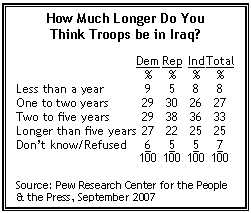by Richard C. Auxier
Iraq emerged as a central issue in Wednesday’s Democratic debate in New Hampshire. Tim Russert, who moderated, brought a new angle to the discussion by asking the candidates if they could pledge that by 2013 — the end of their first term as president — there would be no U.S. troops left in Iraq.
Russert’s question first went to Illinois Senator Barack Obama, who would not make the pledge to have all troops removed by 2013. “I believe that we should have all our troops out by 2013,” said Obama, “but I don’t want to make promises not knowing what the situation’s going to be three or four years out.”
Senator Hillary Clinton of New York also would not pledge to have all troops removed. “Well, Tim, it is my goal to have all troops out by the end of my first term,” said Clinton, who agreed with Obama that it would be difficult to make such a pledge without knowing what she would inherit as president in 2009.

According to a September Pew survey, 73% of Democrats want troops brought home from Iraq as soon as possible, while 21% want to keep troops in Iraq until the situation is stable. Independents also favor bringing troops home as soon as possible (60-34%), while Republicans (69-27%) favor keeping troops in Iraq until the situation is stable.
While there is support for bringing troops home as soon as possible both within the Democratic Party and the general public, this does not mean that public opinion favors an immediate withdrawal. Indeed, a plurality of both Democrats (45%) and independents (39%) prefer a gradual withdrawal over the next year or two. Only 27% of Democrats, 19% of independents and 6% of Republicans favor immediate withdrawal from Iraq. The country as a whole prefers gradual withdrawal to immediate removal by a margin of 34% to 18%.
The other candidates were more specific in their statements on troop removals. Senator Chris Dodd of Connecticut directly answered Russert’s question about removing troops by 2013, stating, “I will get that done.”
Former North Carolina Senator John Edwards said, “I would have our combat troops out of Iraq over a period of several months, and I would not continue combat missions in Iraq.” He would not, though, commit to the 2013 pledge.
New Mexico Governor Bill Richardson stated his position was to pull all troops out. Delaware Senator Joe Biden said he would have the troops out, on the condition that there was not a political solution available when he became president. Rep. Dennis Kucinich of Ohio went so far as to pledge a troop withdrawal by April 2007, some five months ago. (He made light of his misstep by saying he was ready to be president now.)

Regardless of what Democrats may hope for, they are under no illusions that a withdrawal will happen immediately. Only 9% of Democrats believe troops will be brought home in less than a year. Furthermore, roughly the same amount of Democrats (27%) believe it will take longer than five years to remove troops from Iraq, as do those who believe it will take one to two years (29%) or two to five years (29%).
Whatever their variance of views on a timetable for withdrawal, Democratic voters are in strong agreement that their party’s leadership in Congress is not doing enough to challenge President George W. Bush’s policies on Iraq. Only 27% of Democrats believe their leadership in Congress has done enough, while a 61% majority thinks they have done too little.
Clinton defended those in Congress saying, “I think the Democrats have pushed extremely hard to change this president’s course in Iraq.” Her opponents were quick to draw a contrast with Clinton. “And I also disagree with Senator Clinton,” said Richardson. “I don’t believe the Congress has done enough to end this war.”
Dodd also took the opportunity to speak out against the both the war and the front-runners. “If you’re going to seek the presidency of the United States and you’re in a position today to do something about this, then it’s — in my view, it’s the opportunity to stand up and lead on this issue, to bring this war, which is doing great damage to our country, to a halt,” said Dodd.
